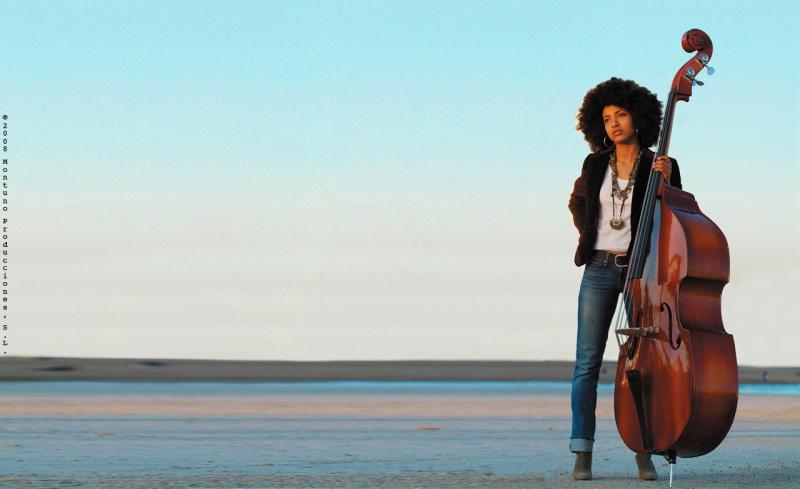Esperanza Spalding, Ronnie Scott's | reviews, news & interviews
Esperanza Spalding, Ronnie Scott's
Esperanza Spalding, Ronnie Scott's
Bone-shakingly funky jazz at Ronnie Scott's

Watching some jazz musicians play live, you're made acutely aware of the intense effort that goes into their performance.
Observing Esperanza Spalding's sunny disposition in the hallowed confines of Ronnie Scott's, on the other hand, you get the impression that she's barely breaking a sweat. What she's actually doing is carving out bone-shakingly funky bass lines, singing some of the most circuitous melodic lines you're likely to hear, and quietly grooving along to the music. This is like patting your head, rubbing your stomach and Morris dancing all at the same time, only about a million times harder.
Encouraged by her mother, Spalding began playing violin at age five, switching to bass a decade later. In 2005, aged just 20, she began teaching at Boston's Berklee College of Music, making her one of its youngest ever faculty members. The time scale almost defies belief. The Portland-born, Texas-based 25-year-old has already worked with some of the greatest names in jazz, including pianist Michel Camilo, guitarist Pat Metheny and sax player Joe Lovano.
Backed by her regular pianist Leo Genovese and drummer Lynden Rochelle, Spalding's wide-ranging set referenced everything from funk and hip-hop to Brazilian and Afro-Cuban rhythms. Whether deconstructing a standard (“Autumn Leaves”), reinventing a pop song (Stevie Wonder's “I Can't Help It”) or performing her own material (“Precious”), Spalding's playful virtuosity and boldly individual arrangements were utterly compelling. Despite the trio format, the textural range was vast, due mainly to the bank of keyboards which surrounded Genovese. Switching at will from glassy Fender Rhodes to organ stabs to cascading torrents of notes on the grand piano, his seductive palette of sound was at times reminiscent of the great Joe Zawinul.
But it was Spalding that you were constantly drawn to, conjuring up contrapuntal feats between voice and bass of such incredible dexterity - and with such sweetness and strength – that if you closed your eyes for a second you'd swear you were listening to a quartet.
More dates from Esperanza Spalding here.
The future of Arts Journalism
You can stop theartsdesk.com closing!
We urgently need financing to survive. Our fundraising drive has thus far raised £49,000 but we need to reach £100,000 or we will be forced to close. Please contribute here: https://gofund.me/c3f6033d
And if you can forward this information to anyone who might assist, we’d be grateful.

Subscribe to theartsdesk.com
Thank you for continuing to read our work on theartsdesk.com. For unlimited access to every article in its entirety, including our archive of more than 15,000 pieces, we're asking for £5 per month or £40 per year. We feel it's a very good deal, and hope you do too.
To take a subscription now simply click here.
And if you're looking for that extra gift for a friend or family member, why not treat them to a theartsdesk.com gift subscription?
more New music
 Album: Mulatu Astatke - Mulatu Plays Mulatu
An album full of life, coinciding with a 'farewell tour'
Album: Mulatu Astatke - Mulatu Plays Mulatu
An album full of life, coinciding with a 'farewell tour'
 Music Reissues Weekly: Sly and the Family Stone - The First Family: Live At Winchester Cathedral 1967
Must-have, first-ever release of the earliest document of the legendary soul outfit
Music Reissues Weekly: Sly and the Family Stone - The First Family: Live At Winchester Cathedral 1967
Must-have, first-ever release of the earliest document of the legendary soul outfit
 Album: Robert Plant - Saving Grace
Mellow delight from former Zep lead
Album: Robert Plant - Saving Grace
Mellow delight from former Zep lead
 Brìghde Chaimbeul, Round Chapel review - enchantment in East London
Inscrutable purveyor of experimental Celtic music summons creepiness and intensity
Brìghde Chaimbeul, Round Chapel review - enchantment in East London
Inscrutable purveyor of experimental Celtic music summons creepiness and intensity
 Album: NewDad - Altar
The hard-gigging trio yearns for old Ireland – and blasts music biz exploitation
Album: NewDad - Altar
The hard-gigging trio yearns for old Ireland – and blasts music biz exploitation
 First Person: Musician ALA.NI on how thoughts of empire and reparation influenced a song
She usually sings about affairs of the heart - 'TIEF' is different, explains the star
First Person: Musician ALA.NI on how thoughts of empire and reparation influenced a song
She usually sings about affairs of the heart - 'TIEF' is different, explains the star
 Album: The Divine Comedy - Rainy Sunday Afternoon
Neil Hannon takes stock, and the result will certainly keep his existing crowd happy
Album: The Divine Comedy - Rainy Sunday Afternoon
Neil Hannon takes stock, and the result will certainly keep his existing crowd happy
 Music Reissues Weekly: Robyn - Robyn 20th-Anniversary Edition
Landmark Swedish pop album hits shops one more time
Music Reissues Weekly: Robyn - Robyn 20th-Anniversary Edition
Landmark Swedish pop album hits shops one more time
 Album: Twenty One Pilots - Breach
Ohio mainstream superstar duo wrap up their 10 year narrative
Album: Twenty One Pilots - Breach
Ohio mainstream superstar duo wrap up their 10 year narrative
 Album: Ed Sheeran - Play
A mound of ear displeasure to add to the global superstar's already gigantic stockpile
Album: Ed Sheeran - Play
A mound of ear displeasure to add to the global superstar's already gigantic stockpile
 Album: Motion City Soundtrack - The Same Old Wasted Wonderful World
A solid return for the emo veterans
Album: Motion City Soundtrack - The Same Old Wasted Wonderful World
A solid return for the emo veterans
 Album: Baxter Dury - Allbarone
The don diversifies into disco
Album: Baxter Dury - Allbarone
The don diversifies into disco

Add comment